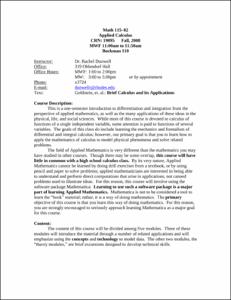Please use this identifier to cite or link to this item:
http://hdl.handle.net/10267/15674Full metadata record
| DC Field | Value | Language |
|---|---|---|
| dc.contributor.author | Dunwell, Rachel M. | - |
| dc.date.accessioned | 2013-02-27T17:00:21Z | - |
| dc.date.available | 2013-02-27T17:00:21Z | - |
| dc.date.issued | 2008-08-27 | - |
| dc.identifier.uri | http://hdl.handle.net/10267/15674 | - |
| dc.description | This syllabus was submitted to the Office of Academic Affairs by the course instructor. Uploaded by Archives RSA Josephine Hill. | en_US |
| dc.description.abstract | This is a one-semester introduction to differentiation and integration from the perspective of applied mathematics, as well as the many applications of these ideas in the physical, life, and social sciences. While most of this course is devoted to calculus of functions of a single independent variable, some attention is paid to functions of several variables. The goals of this class do include learning the mechanics and formalism of differential and integral calculus; however, our primary goal is that you to learn how to apply the mathematics of calculus to model physical phenomena and solve related problems. The field of Applied Mathematics is very different than the mathematics you may have studied in other courses. Though there may be some overlap, this course will have little in common with a high school calculus class. By its very nature, Applied Mathematics cannot be learned by doing drill exercises from a textbook, or by using pencil and paper to solve problems; applied mathematicians are interested in being able to understand and perform direct computations that arise in applications, not canned problems used to illustrate ideas. For this reason, this course will involve using the software package Mathematica. Learning to use such a software package is a major part of learning Applied Mathematics. Mathematica is not to be considered a tool to learn the “book” material; rather, it is a way of doing mathematics. The primary objective of this course is that you learn this way of doing mathematics. For this reason, you are strongly encouraged to seriously approach learning Mathematica as a major goal for this course. | en_US |
| dc.language.iso | en_US | en_US |
| dc.publisher | Memphis, Tenn. : Rhodes College | en_US |
| dc.relation.ispartofseries | Syllabi CRN;19095 | - |
| dc.rights | Rhodes College owns the rights to the archival digital objects in this collection. Objects are made available for educational use only and may not be used for any non-educational or commercial purpose. Approved educational uses include private research and scholarship, teaching, and student projects. For additional information please contact archives@rhodes.edu. Fees may apply. | - |
| dc.subject | Syllabus | en_US |
| dc.subject | Curriculum | en_US |
| dc.subject | Academic departments | en_US |
| dc.subject | Text | en_US |
| dc.subject | Mathematics and Computer Science, Department of | en_US |
| dc.subject | 2008 Fall | en_US |
| dc.title | MATH 115-02, Applied Calculus, Fall 2008 | en_US |
| dc.type | Syllabus | en_US |
| Appears in Collections: | Course Syllabi | |
Files in This Item:
| File | Description | Size | Format | |
|---|---|---|---|---|
| 2008_FALL_MATH_115-02_19095.pdf | 155.25 kB | Adobe PDF |  View/Open |
Items in DSpace are protected by copyright, with all rights reserved, unless otherwise indicated.